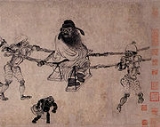
Zhong Kui
Encyclopedia
Zhong Kui is a figure of Chinese mythology
. Traditionally regarded as a vanquisher of ghosts and evil beings, and reputedly able to command 80,000 demon
s, his image is often painted on household gates as a guardian spirit, as well as in places of business
where high-value goods are involved.
s at the capital. Though Zhong achieved top honours in the exams, his title of "zhuangyuan" was stripped by the emperor because of his disfigured appearance. In anger, Zhong Kui committed suicide
upon the palace steps by hurling himself against the palace gate until his head was broken. Du Ping buried him. After Zhong became king of ghosts in Hell, he returned to his hometown on the Chinese New Year's Eve
. To repay Du Ping's kindness, Zhong Kui gave his younger sister in marriage to Du.
sources, once the Emperor Xuanzong was gravely ill. He had a dream in which he saw two ghosts. The smaller of the ghosts stole a purse from imperial consort Yang Guifei
and a flute belonging to the emperor. The bigger ghost, wearing the hat of an official, captured the smaller ghost, tore out his eye and ate it. The bigger ghost then introduced himself as Zhong Kui. He said that he had sworn to rid the empire of evil
. When the emperor awoke, he had recovered from his illness. So he commissioned the court painter Wu Daozi
to produce an image of Zhong Kui to show to the officials. This was highly influential to later representations of Zhong.
Chinese mythology
Chinese mythology is a collection of cultural history, folktales, and religions that have been passed down in oral or written tradition. These include creation myths and legends and myths concerning the founding of Chinese culture and the Chinese state...
. Traditionally regarded as a vanquisher of ghosts and evil beings, and reputedly able to command 80,000 demon
Demon
call - 1347 531 7769 for more infoIn Ancient Near Eastern religions as well as in the Abrahamic traditions, including ancient and medieval Christian demonology, a demon is considered an "unclean spirit" which may cause demonic possession, to be addressed with an act of exorcism...
s, his image is often painted on household gates as a guardian spirit, as well as in places of business
Business
A business is an organization engaged in the trade of goods, services, or both to consumers. Businesses are predominant in capitalist economies, where most of them are privately owned and administered to earn profit to increase the wealth of their owners. Businesses may also be not-for-profit...
where high-value goods are involved.
Becoming the king of ghosts
According to folklore, Zhong Kui travelled with Du Ping (杜平), a friend from his hometown, to take part in the imperial examinationImperial examination
The Imperial examination was an examination system in Imperial China designed to select the best administrative officials for the state's bureaucracy. This system had a huge influence on both society and culture in Imperial China and was directly responsible for the creation of a class of...
s at the capital. Though Zhong achieved top honours in the exams, his title of "zhuangyuan" was stripped by the emperor because of his disfigured appearance. In anger, Zhong Kui committed suicide
Suicide
Suicide is the act of intentionally causing one's own death. Suicide is often committed out of despair or attributed to some underlying mental disorder, such as depression, bipolar disorder, schizophrenia, alcoholism, or drug abuse...
upon the palace steps by hurling himself against the palace gate until his head was broken. Du Ping buried him. After Zhong became king of ghosts in Hell, he returned to his hometown on the Chinese New Year's Eve
Chinese New Year
Chinese New Year – often called Chinese Lunar New Year although it actually is lunisolar – is the most important of the traditional Chinese holidays. It is an all East and South-East-Asia celebration...
. To repay Du Ping's kindness, Zhong Kui gave his younger sister in marriage to Du.
Popularization in later dynasties
Zhong Kui's popularity in folklore can be traced to the reign of Emperor Xuanzong of Tang China (712 to 756). According to Song DynastySong Dynasty
The Song Dynasty was a ruling dynasty in China between 960 and 1279; it succeeded the Five Dynasties and Ten Kingdoms Period, and was followed by the Yuan Dynasty. It was the first government in world history to issue banknotes or paper money, and the first Chinese government to establish a...
sources, once the Emperor Xuanzong was gravely ill. He had a dream in which he saw two ghosts. The smaller of the ghosts stole a purse from imperial consort Yang Guifei
Yang Guifei
Consort Yang Yuhuan , often known as Yáng Guìfēi , known briefly by the Taoist nun name Taizhen , was known as one of the Four Beauties of ancient China...
and a flute belonging to the emperor. The bigger ghost, wearing the hat of an official, captured the smaller ghost, tore out his eye and ate it. The bigger ghost then introduced himself as Zhong Kui. He said that he had sworn to rid the empire of evil
Evil
Evil is the violation of, or intent to violate, some moral code. Evil is usually seen as the dualistic opposite of good. Definitions of evil vary along with analysis of its root motive causes, however general actions commonly considered evil include: conscious and deliberate wrongdoing,...
. When the emperor awoke, he had recovered from his illness. So he commissioned the court painter Wu Daozi
Wu Daozi
Wu Daozi was a Chinese artist of the Tang Dynasty, famous for initiating new myths in his artwork.The myth follows the creation by Wu Daozi of a mural commissioned by Emperor Xuanzong of Tang China...
to produce an image of Zhong Kui to show to the officials. This was highly influential to later representations of Zhong.

